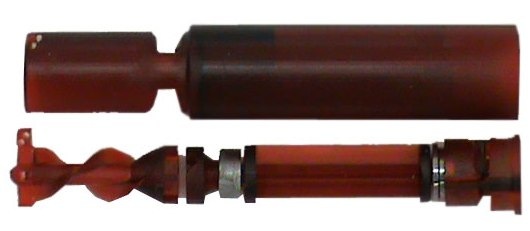Jul 7 2009
A tiny heart catheter pump which supports the human heart in critical conditions while pumping has been developed at the Vienna University of Technology (TU Vienna).
The pump may not be larger than five millimetres and no longer than 45 millimetres at a ratio of 1:1. It reaches the heart via a catheter and, placed in the heart valves, helps to pump blood from the heart. The pump drive which is operated pneumatically is particularly innovative. Construction scientists at the TU Vienna have produced a prototype of a ratio of 2:1 commissioned by heart surgeon and university professor Werner Mohl.
"The aim was to avoid the development of heat which is caused by heart pumps that are driven by an electric motor. The heat which is produced is transferred to the blood. Professor Mohl approached us with a request to construct a pump with pneumatic air propulsion which doesn't have to be cooled, explains project manager and associate professor Margit Gföhler from the Institute for Engineering Design and Logistics Engineering at the TU Vienna.
Assistant professor and project colleague Helmut Mad adds: "The heart catheter pump is intended for temporary bridging after an operation or after a heart attack. It is supposed to be used for a maximum of five to ten days. The pump is powered with compressed air via a tube. Of course, the blood which is transported is hermetically separated from the compressed air. The target capacity should be five litres per minute." With its technical benchmark data, the heart catheter pump is a very challenging activity from a construction point of view. Gföhler: "Given its size, it is difficult to obtain purchased parts and storage" Special manufacturing and production processes which can be very expensive are required."
A second prototype has now been produced from a ceramic in collaboration with the Institute of Materials Science and Technology of the TU Vienna. The project was supported by the FFG (Austrian Research Promotion Agency) with an innovation cheque. Margit Gföhler and Werner Mohl plan to continue their research project and would like to submit it as part of the FWF funding programme BRIDGE.
http://www.tuwien.ac.at/tu_vienna/